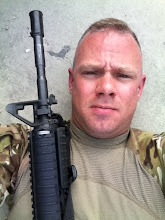I'm still waiting on my soldier to arrive from the U.S. (whose weapons were lost in transit by Delta Airlines) before I can make the final leg of my journey into Aghanistan. Aside from Sleeping, the gym, and MWR, I eat. We have four opportunities to eat in the DFAC (dining facility) a day. If you're used to eating in a DFAC in the U.S. but not overseas in a combat zone, these things are truely a sight to behold.
Defense contractors that have profited over this last decade in the Middle East have gotten a lot of bad press with no-bid contracts and other unethical business practices facilitated through the previous executive administration. I'm not here to defend those practices. Although their services, paid for at two to ten times what most Service Members are paid, allow troops in combat support and service support roles to take a more active role in force protection rather than holding them to their safer occupational specialties. Thus more warfighters. Statistically speaking, for every one warfighter, there are two support personnel performing some non-combat role.
One thing I do appreciate that defense contractors provide better than the Military can provide itself are the exceptional DFACs throughout the Middle East theater of operations. The DFACs over here are operated by several Government contractors. The major player is KBR, a subsidiary of Halliburton. To be fair, the majority of DFACs in the U.S. are run in part or whole by contracted food service companies as well with some Military oversight. The difference is the quality, selection, and portion size in combat zones is beyond comparison with those in the U.S.
DFACs in the CONUS (Continental U.S.) U.S. Army installations are relatively small (typically the size of a packed medium sized restaurant) and have a poor selection of food and an especially poor selection of healthy food. They're still stuck in the 1960s in the thought process of healthy eating. For example: "starches" are a vegetable, you can't have more than one item with meat in it, Gatorade is sometimes pushed as a drink for those on the weight control program, potatoes are considered a healthy fat free choice for those trying to lose weight, macaroni and cheese and corn are healthy vegetables, fresh fruit, vegetables, fruit juice are in short supply, and there's usually a better selection of fried, fast, and junk food than there is from the "healthier" main food line. The quality of the food also leaves something to be desired as the majority of the meat comes in the form of an all purpose meat patty (often breaded) cooked with different sauces (similar to putting lipstick on a pig), and most everything appears to have been in a warmer for at least one or two days before serving. About the only things cooked on the spot are the hamburgers.
In comparison, DFACs in combat zones are typically the size of several gymnasiums if not the size of an entire football field. There're usually four or five meat choices and a variety of fresh vegetables. Just don't ask what countries they originated from. The salad bars are packed and the condiment selection leaves nothing to be desired. Breakfast, my personal favorite, is stocked with a selection that would rival any Shoney's breakfast buffet. To drink most of the common juices are available as well as some more exotic ones. About any type and flavor of milk made is carried, in addition to a complete selection of soft drinks and sweet and unsweet tea. Did I mention the desert counter complete with ice cream? (I probably better not) Of course you can go through a second time, but you don't need to since you can get as much as you want the first time through without limits.
What I described above is available at most large camps and FOBs (Forward Operating Bases). Those who are stuck in small outposts and smaller camps AKA COPs (Combat Outposts) are not so lucky, but the food is still typically better than what is served back in CONUS.
Of course all of this quantity, quality, and selection comes at a price. Like the rest of America, the military is fighting a war on weight control. If we don't stay active while deployed a large number of us come home heavier than before we left. Yes, these mega DFACs are a huge morale booster, but at what cost? Napoleon said an "Army runs on its stomach", but too much of a belly and you can't pass the required run time on your next physical fitness test.
More to follow.



No comments:
Post a Comment
Your comments will be logged and reviewed for appropriateness.